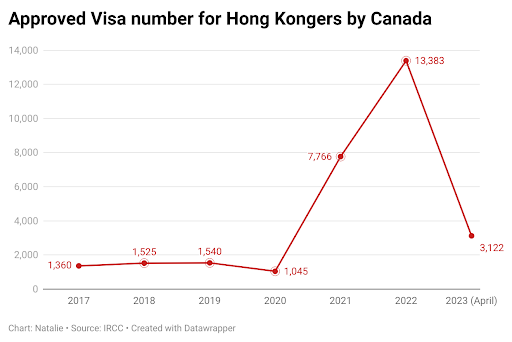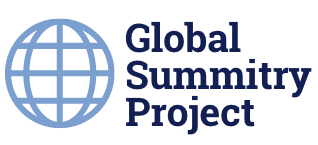
Natalie Chan
Natalie Chan is a journalism student at the University of Toronto and Centennial College with a strong interest in global affairs, immigration, and storytelling. She has written for publications like the Toronto Observer and has explored topics ranging from cultural adaptation to policy analysis. In her free time, she enjoys exploring new cafés, playing volleyball and snowboarding.
Many Hong Kong immigrants to Canada are facing job struggles, underemployment, and slow processing of permanent residence (PR) applications, raising doubts about the effectiveness of a key immigration pathway before its 2026 expiration.
“Even when I get interviews, hiring managers hesitate because I don’t have local experience,” said Jason Chan, a former risk management analyst from Hong Kong.
Why are Hong Kongers leaving?
Since 2020, tens of thousands of Hong Kongers have sought to leave Hong Kong due to political instability and the crackdown on civil liberties following the enactment of China’s national security law. The controversial law significantly restricts political expression, making it illegal to criticize the Chinese government or voice support for Hong Kong’s independence, raising widespread concerns over freedom of speech, press, and political dissent.

In response, many Hong Kongers, particularly young professionals and their families, have chosen to immigrate to democratic countries, including Canada, the UK, and Australia.
In 2021, Immigration, Refugees and Citizenship Canada (IRCC) introduced the work stream visa program to help Hong Kongers transition to PR through work experience in Canada.
What is the Hong Kong Pathway?
To support Hong Kongers seeking to relocate, Canada launched the Hong Kong Pathway program offering two main immigration streams, one through study and the other through work experience.
The study stream is for Hong Kong residents who have graduated from a Canadian post-secondary institution within the last three years. Applicants can apply for PR immediately, making this pathway one of the fastest routes to settlement.
The work stream is designed for Hong Kongers who have at least one year of full-time work experience in Canada. Unlike the study stream, applicants must first secure employment before applying for PR, which makes it more challenging for those struggling to find stable jobs.
Both pathways offer a temporary open work permit for up to three years, allowing applicants to live and work in Canada while they complete the necessary requirements for PR. However, as the program nears its 2026 expiration, many immigrants are struggling to secure stable employment, gain financial security, and integrate into Canadian society.
Job market challenges and underemployment
“The biggest challenges I’ve faced in my job search are mainly because of not having PR and no Canadian work experience or education,” Chan said.
Despite an extensive background in corporate finance, Chan was unable to find a job in his field. He eventually accepted a customer service role at a securities company, which was the only offer that provided a permanent contract. However, two months into the job, his manager warned him he was unlikely to pass probation. He resigned as a result after three months and is now back to job hunting.
“I would say for every 100 jobs I apply to, I only get one or two interviews,” Chan said in a phone interview.
While some Hong Kongers have struggled to find work in their original industries, others have successfully transitioned into new fields.
Adapting to a new industry
Eric Leung, who moved to Canada in 2024 with a background in economics, initially planned to work in banking or accounting. However, before moving, he taught himself how to code and set his sights on a developer job in Canada.
“As far as switching to a different industry is concerned, I thought about transitioning into more of a full-fledged software engineer,” Leung said.
He secured a role as a data developer and engineer in commercial real estate, which allowed him to enter the workforce relatively smoothly compared to other immigrants.
Unfortunately, for Sammi Au, the job search was far more challenging.
“I just knew that finding a job here in Canada would be tough, so I was already prepared to be unemployed for the first one to three months after arriving,” said Au, a social worker in a special needs school.
Some Hong Kongers have considered taking on unrelated work due to the difficulty of finding a job in their original field. Au, a former special needs school social worker in Hong Kong, faced a similar challenge when she moved to Canada.
“I actually could have transferred my social work licence to Toronto, but to be honest, I was just lazy,” Au said. “At first, I was looking for something related, like working with special needs children, but honestly, I’m open to any job because finding work in Toronto is tough.”
Au had low expectations for job hunting but still secured an offer just 10 days after arriving in Canada. However, after a year of long commutes by public transit, she decided to quit.
Both Chan and Au have considered switching careers or returning to school to improve their job prospects. Chan is now studying for a finance-related certification in Canada (Canadian Securities Course) to add a Canadian credential to his resume.
“Having a Canadian degree makes job hunting way easier,” Au said. “And in my field, you can’t really move up without a master’s degree.”
Immigration consultant’s perspective
Jay Chan, an immigration consultant with no relation to Jason Chan, says the biggest issue Hong Kong immigrants face is securing stable employment to qualify for PR in a phone interview.
“Many arrive with highly skilled backgrounds, but without Canadian work experience or credentials, they struggle to find jobs in their industries,” Jay Chan said. “Some end up taking minimum wage jobs that hardly make a living.”
“Canada’s immigration pathways are good options, but they come with stricter requirements compared to the UK and Australia,” Jay Chan said.
Jay Chan also noted that PR processing times have increased significantly, making it difficult for Hong Kongers to plan for the future.
“A few years ago, PR applications took six to nine months. Now, many applicants experience delays of up to 20 months,” Jay Chan said.
With the Hong Kong Pathway set to expire in 2026, Jay Chan believes the program should be extended or modified.
“The political situation in Hong Kong hasn’t changed. Many people still want to leave but don’t qualify under the current requirements,” Jay Chan said.
Cultural and social challenges
Beyond employment struggles, many Hong Kong immigrants find adjusting to Canadian workplace culture challenging. The more relaxed and informal work environment in Canada contrasts sharply with the fast-paced, efficiency-driven culture in Hong Kong.
“I still haven’t quite figured out what people mean by being ‘chill’ in a Canadian workplace. Sometimes, I feel like I’m doing too much or too little at the wrong moments,” Jason Chan said.
The challenges of daily life in Canada also extend to social interactions and lifestyle adjustments.
“Canada’s climate can also be a challenge,” Leung said. “People aren’t very keen on going out in the winter especially if where they live isn’t connected that well. So a majority of the time I’d be spending time on my own.”
PR processing delays and uncertain future
Many Hong Kong immigrants also say they expected Canada’s PR process to be smoother. However, the review processing delays have complicated their long-term settlement plans.
Jason Chan, who has yet to accumulate enough work hours to apply for PR, has also observed delays in approvals as the 2026 expiration for Hong Kong immigrants draws closer.
“I just hope the federal government follows through on its promise to prioritize processing for the Hong Kong Pathway,” he said.
